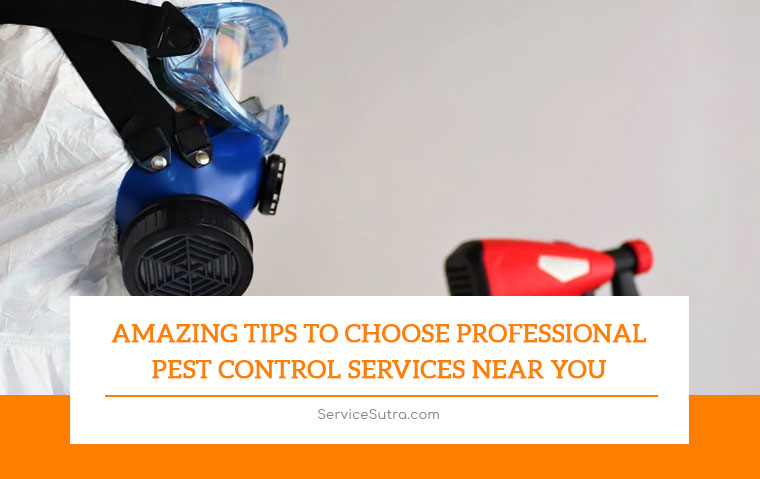Pest Control Clovis Specialists: Shielding Your Family Members and Home
Wiki Article
Comprehending the Different Methods to Pest Control: A Comprehensive Overview

Natural Parasite Control Methods
Utilizing environment-friendly methods such as friend growing and organic pest control is crucial for effectively managing parasites in agricultural settings. Buddy growing involves growing different plants in distance to discourage parasites, enhance nutrient uptake, and boost total plant health. Planting marigolds alongside tomatoes can help repel nematodes. Intercropping maize with vegetables can disrupt the reproduction patterns of bugs like corn borers.Organic bug control involves presenting natural killers or microorganisms to control pest populaces. Ladybugs, for instance, feed on aphids, regulating their numbers without the need for chemical pesticides. An additional example is using Bacillus thuringiensis (Bt), a bacterium that targets details insect bugs while being harmless to people, animals, and helpful insects.
These green techniques not just decrease the dependence on synthetic chemicals but likewise help protect biodiversity and dirt health and wellness. By incorporating natural parasite control approaches into farming practices, farmers can attain sustainable parasite administration while decreasing unfavorable influence on the atmosphere.

Chemical Bug Control Solutions
Along with all-natural parasite control techniques, the application of chemical bug control remedies plays a considerable role in successfully managing pest populaces in farming settings. Chemical bug control solutions are created to target particular parasites that might cause substantial damage to plants. These remedies commonly include artificial pesticides that are made to eradicate parasites swiftly and effectively.Among the vital benefits of chemical parasite control options is their efficiency in managing insect invasions on a big scale. Farmers can apply these solutions using various approaches such as splashing, airing out, or seed therapy to secure their plants from unsafe pests, weeds, and conditions. In addition, chemical bug control remedies are reasonably very easy to use and can provide quick outcomes, aiding farmers secure their returns and reduce economic losses.
Nonetheless, it is necessary to utilize chemical pest control solutions carefully to reduce possible adverse effect on the setting, non-target organisms, and human health. Proper application strategies, adherence to security guidelines, and normal tracking are crucial to make certain the accountable usage of chemical bug control services in farming practices.
Organic Pest Control Approaches
Organic pest control comes close to leverage natural killers or read the full info here microorganisms to manage bug populations in farming settings properly. This technique supplies a sustainable and green option to pest monitoring, minimizing the reliance on synthetic chemicals and decreasing damage to the setting. One typical biological control approach is the intro of natural enemies, such as ladybugs or parasitical wasps, to target certain bugs. These predators feed on the parasites, assisting to manage their populations normally - pest control clovis.An additional biological control method entails utilizing pathogens like germs, fungi, or infections to contaminate and kill bugs. In general, organic bug control methods supply a sustainable and targeted remedy to pest administration in farming.
Integrated Bug Management (IPM)
Integrated Parasite Management (IPM) is a comprehensive approach that incorporates different pest control approaches to effectively handle and minimize pest populaces in farming systems. IPM concentrates on lasting prevention of parasites through a combination of biological, social, physical, and chemical control approaches. By integrating these different strategies, IPM intends to minimize reliance on chemical pesticides, decrease ecological impact, and advertise sustainable insect monitoring methods.
One key facet of IPM is using organic controls such as natural predators, bloodsuckers, and pathogens to control pest populations. This technique uses the power of nature to maintain a balance between bugs and their all-natural adversaries without creating damage to the setting.
Additionally, IPM includes social practices like crop rotation, habitat, and cleanliness manipulation to produce undesirable problems for parasites and interrupt their life process. Physical controls such as barriers, catches, and mulches are likewise made use of to stop insect problems.
Mechanical and Physical Parasite Control Strategies
Utilizing non-chemical techniques, such as mechanical and physical insect control methods, is a vital facet of comprehensive pest administration methods, building on the foundation of Integrated Bug Management's alternative strategy. Mechanical parasite control entails the usage of physical obstacles or try here traps to stop pests from accessing and damaging crops or frameworks. This technique can consist of techniques like installing displays on windows, using row covers in agriculture, or employing sticky catches to catch pests.Physical insect control methods, on the various other hand, concentrate on straight eliminating parasites with physical means. For example, utilizing heat therapies to remove bed bugs or vacuuming up pests like spiders or ants can be efficient ways to take care of invasions without making use of chemicals. By incorporating these physical and mechanical pest control methods right into an Integrated Insect Monitoring plan, professionals and people can lower reliance on pesticides while still effectively reducing and taking care of pest populations damage.
Verdict

In enhancement to all-natural insect control approaches, the application of chemical bug control options plays a considerable function in efficiently managing pest populaces in farming atmospheres.One of the essential advantages of chemical insect control solutions is their performance in managing pest problems on a big scale.Integrated Bug Monitoring (IPM) is a thorough technique that integrates various bug control techniques to properly take care of and reduce pest populaces in agricultural systems.Making use of non-chemical methods, such as physical and mechanical insect control strategies, is a critical aspect of thorough insect monitoring techniques, constructing upon the foundation of Integrated Bug Monitoring's alternative technique. By incorporating these physical and mechanical insect control methods right into an Integrated Pest Administration strategy, experts and people can reduce reliance on chemicals while still effectively managing pest populaces and minimizing damage.
Report this wiki page